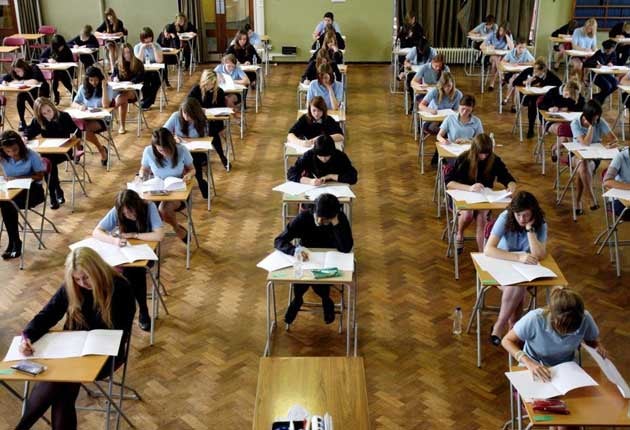Boys still lag behind in GCSEs

Your support helps us to tell the story
From reproductive rights to climate change to Big Tech, The Independent is on the ground when the story is developing. Whether it's investigating the financials of Elon Musk's pro-Trump PAC or producing our latest documentary, 'The A Word', which shines a light on the American women fighting for reproductive rights, we know how important it is to parse out the facts from the messaging.
At such a critical moment in US history, we need reporters on the ground. Your donation allows us to keep sending journalists to speak to both sides of the story.
The Independent is trusted by Americans across the entire political spectrum. And unlike many other quality news outlets, we choose not to lock Americans out of our reporting and analysis with paywalls. We believe quality journalism should be available to everyone, paid for by those who can afford it.
Your support makes all the difference.Boys are falling further behind girls at GCSE because they "lack the maturity" to aim for top grades, it was suggested today.
National GCSE results have revealed a widening gender gap, especially at A* and A grade as boys struggle to keep up with their female classmates.
More than one in four (26.5%) of girls' entries were awarded an A or A* this summer, compared with 19.8% of boys' exams, according to data published by the Joint Council for Qualifications (JCQ).
This is a gap of 6.7 percentage points - the widest it has been since the A* grade was introduced in 1994.
It is the opposite of A-levels, where last week's figures showed that boys are closing the gap in top grades.
The gender gap has also widened at A*-C for GCSE. This year 66% of boys' exams gained at least a C compared with 73.5% of girls', a difference of 7.5 percentage points. Last year the gap was 7.2%.
Brian Lightman, general secretary of the Association of School and College Leaders, said: "At A-level, boys are clearly very focused on the grades they need for university entry.
"Boys will focus on a means to an end and they will therefore aim for the end, and we've seen an increase in that.
"At GCSE perhaps that sort of maturity that girls have at that stage is not quite there with the boys, and they can't see that obvious reason to aim for the A*."
Mr Lightman added that the increasing numbers of girls taking separate sciences at GCSE could be fuelling the gender gap.
"Girls were not opting for separate sciences as much a few years ago. There's now been a big increase in the confidence of girls to do more science, to specialise in science - the outcome of that is extremely positive, and they're getting top grades at the end of it."
Andrew Hall, chief executive of the AQA exam board, admitted he did not know why there was such a gap between boys and girls at GCSE level, saying: "We've scratched our heads over this.
"I think there's a good question for some social psychologists."
Around 650,000 teenagers in England, Wales and Northern Ireland received their GCSE results today in what was another record year for results.
The pass rate rose for the 23rd year in a row, with almost seven in 10 entries (69.8%) gaining at least a C grade.
And nearly one in four exams (23.2%) were awarded a coveted A or A*, up from 22.6% in 2010.
But while youngsters won plaudits for their grades, concerns were raised that the numbers of youngsters taking languages, history and geography have declined drastically.
Entries for French and German slumped again this year, as did those for Spanish - the first reported decrease for this language since 2006.
History entries are down around 2,700, and geography entries have slumped by a massive 13,800 in a year.
More students are taking separate science subjects at GCSE, and there has been a marked increase in religious studies entries.
Schools minister Nick Gibb said: "While it is encouraging to see the rising uptake in maths and single sciences, it is worrying that once again there are falling numbers studying languages."
Christine Blower, general secretary of the National Union of Teachers, said: "The fact that modern languages continue to decline is disappointing, especially taking into account our place in a global society and economy.
"This issue needs to be addressed in the Government's review of the national curriculum in order to reverse this extremely troubling trend."
PA
Subscribe to Independent Premium to bookmark this article
Want to bookmark your favourite articles and stories to read or reference later? Start your Independent Premium subscription today.
Join our commenting forum
Join thought-provoking conversations, follow other Independent readers and see their replies
Comments